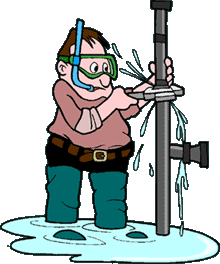Is It Time to Call a Plumber?
Posted on July 12, 2017

My neighbor, Steve, is a self-proclaimed handyman. He told me about one of his recent weekend projects replacing his kitchen faucet. His wife immediately asked, “Shouldn’t you call a plumber?” “What? Call a Plumber? Nonsense,” he responded. Calling a plumber would cost at least $150. Besides, how hard can it be to replace a faucet? Steve spent the next four hours wrenching, cursing, and ultimately sawed out the old faucet and installed a new one. His wife inspected the final product, “Is it supposed to be so wobbly,” she asked skeptically. “Just need to tighten it up a bit,” he replied. An hour later, he secured the faucet on one side but only by stripping the brass fitting on the other. Steve and his wife decided they could live with his DIY plumbing because “it wasn’t that bad.” They settled for less than perfect.
Later that day Steve’s wife heard a dripping sound in the ceiling below the kitchen. Upon inspection, Steve discovered all the pushing and pulling broke the weld of a copper pipe fitting in the ceiling beneath the sink. His decision to avoid hiring a professional and his money saving home plumbing efforts led to a more expensive disaster. Steve finally conceded, “I think it is time to call the plumber.”
In the recruiting world, we see a lot of “Steves” who conduct candidate searches themselves in an effort to keep costs down. We speak with countless hiring managers in the LBM industry running into problems after “doing it themselves” when looking for top talent. Their internal recruiting staff runs their own ads to spread the word with suppliers and colleagues in the industry. As a result, we often hear they fail to find the right person in the first place or that vacancies leave holes in the team for months before hiring the right candidate. To be candid, hiring is not a core competency for most companies in the LBM industry and for that reason, companies need to understand when it is time to call in the professionals.
A few weeks ago, I received a call from a Regional Vice President of a renowned National Manufacturer. She told me her company failed to fill a key position for six months and that they might have to “settle” for one of the candidates they already interviewed. Why would anyone settle when it comes to hiring? Much like Steve’s wobbly sink anecdote, settling on a candidate can prove very costly in the end.
This is not a knock on internal recruiting. Many hiring managers in the LBM industry successfully hire great candidates on their own in a cost effective manner. There are a lot of efficient ways a company can conduct its own recruiting for certain positions. Recruiters are expensive and the really good ones are very expensive. Like Steve, many companies assume they will save money by DIY recruiting. Our Best-In-Class clients do their own recruiting when appropriate, but also know when to call in the recruiter. They realize partnering with the best recruiters will provide the most return on investment. You should look to collaborate with a reputable company who will help you make the distinction between what to use a recruiter for or not.
Steve’s wife knew when to call the plumber and Best-In-Class clients know when to call in a recruiter. These companies know that it would be too expensive to have a recruiter working on all roles. They also understand what roles warrant a recruiter, what recruiting services provide, and which recruiter to call. For those new to working with recruiters, these factors may seem a bit convoluted. Let’s dig into these areas a bit:
When to Call a Recruiter: There is no specific time to hire a recruiter. The hiring company must use their judgement. First, they must ask the following questions to approximate opportunity cost:
- Who handles recruiting in your company?
- How long will it take them to source and interview candidates?
- What will this ultimately cost to handle the process in- house?
- What if you hire the wrong person?
- Do we have a defined hiring process to put all candidates through?
- Who will take the lead on this project and what work gets put to the side while they take on this project?
The hiring company must also consider the complexity of the job, characteristics of the ideal candidate, the number of qualified candidates in the area, and level of urgency to fill the position. If the position is complex, requires experience, is critically important, highly visible, needs to be kept confidential, and/or time-sensitive, then it’s time to call the recruiter!
Roles that Call for a Recruiter: Much like timing, there is no exact answer for this. A quality recruiter will ensure the best candidates assume any given role. Job openings in sales, engineering, management, and strategy require a more refined search that make partnering with a recruiter beneficial. Companies recruiting externally for senior positions such as vice presidents, directors, and c-suite executives should always leverage industry expert recruiters not only for investment purposes but also to mitigate risk. That being said, recruiters have been used to fill roles from CDL up to CEO, there are no hard-fast rules.
What Recruiting Services Entail: Recruiters go far beyond posting on job boards. For the most senior roles, recruiters may forgo posting online all together. Some people may look at our work and think “all they do is post jobs on LinkedIn or pull resumes off Monster.” It’s easy and anyone can do it, right? Not quite. Recruiters do utilize LinkedIn and Indeed, however our postings are mostly seen by you, the hiring authority. The problem with resume boards, like Monster and Career Builder, is that they tend to produce more “recycled” candidates or the person who is “always looking.” Avoid a hiring mistake by avoiding resume job boards. Be sure you ask if your recruiter uses job boards. If so, don’t waste your money, job boards produce very limited results.
A quality recruiter will have a network of industry specific contacts which he/she will use to make targeted inquires for, thus, they should bring you candidates who, prior to their call, are not looking but rather working hard for another company. It is the recruiter’s job to source and contact the highest caliber prospects, develop a trusting relationship, and ultimately deliver them to you. A good recruiter should have more than a few months or years of experience and expertise in the LBM industry and a recruiting strategy, we match our clients with the best quality candidates.
After candidate placement, their work is not done. The best recruiters follow up with their client to make sure they sourced the best candidate. If the arrangement doesn’t work out, the recruiter will continue the process. Much like a plumber guarantees a warranty on their work, a recruiter’s services go beyond the initial match to ensure lasting quality.
A relationship with your recruiter should also include conversations on hiring information in the market; where the hiring is happening, trends in compensation, hot jobs, etc. Understand that as a trusted advisor, a reputable recruiter will never divulge confidential or competitive information but can supply you with general “what’s happening” information in your segment without naming names or breaking trusts. This information is valuable in determining hiring strategies in your company or keeping up with compensation trends in the industry. He/she should be an excellent resource, someone you can feel confident in what he is telling you to be accurate.
Which Recruiter to Call: There are many venerable recruiting firms that do an outstanding job for their clients. However, when it comes to hiring industry specific candidates, you want to partner with the experts. Industry focused recruiters possess a deep understanding of the skills required for critical positions and maintain long lasting relationships nation-wide that vastly increase the pool of qualified candidates.
Most of us are like Steve; when we are faced with a problem, we try to fix it ourselves. We sometimes settle for mediocre results for our hires because don’t have the time to properly screen a candidate or we don’t want to pay a fee to a firm to find one. Like plumbing mistakes, hiring hastily or settling for a candidate can lead to expanded damage, rework, and unforeseen costs. When filling strategic roles in the LBM industry, look to partner with an expert you can trust to on-board the best employees that will make positive impacts within your organization.
Mark Barnard is founder, President, and CEO of SnapDragon Associates, LLC, a Lumber and Building Materials Industry specific recruiting firm.
www.snapdragonassociates.com || 603-621-9037 || mark@snapdragonassociates.com





